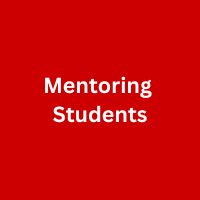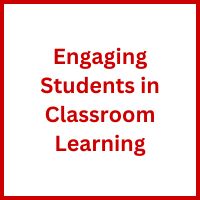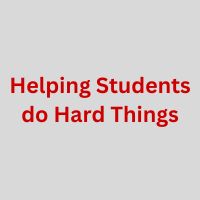 |
What a great turnout at last week’s (11/6/25) Teaching Matters morning coffee! Sixteen colleagues from across academic divisions and offices joined us to wrestle with the challenges–new and old–of designing and implementing effective in-class assessments. We talked through some of our reasons for using in-class assessments, including long-term pedagogical practices and more recent AI-related concerns. In the process, colleagues shared a variety of approaches that are working in their classrooms, including:
|
CfLT Newsletter
The posts below are from the CfLT newsletter which includes curated, research-based digital resources to support ongoing faculty development and pedagogical engagement. As of August 2025, CfLT Director Karen Spierling oversees the content. Posts from July 2020-May 2025 were compiled by previous Director Lew Ludwig.
Mentoring Students

These resources address ways to connect with our students as mentors:
- The Wellbeing Enhances Learning (WEL) Model from University of Minnesota
- Mentoring Students Can Make a Difference by Camey Andersen and Kenneth Alford
- Mentoring Undergraduates by Maryellen Weimer
- Using Interviews to Assess and Mentor Students by Barbara Gardner & Kenneth Alford
- The Benefits of Student-Faculty Mentoring Relationships from Watermark
- How to Get the Most Out of College from The New York Times
- Students Think Faculty Should be Mentors.
Engaging Students in Classroom Learning

These articles give ideas on student engagement during class time:
- Overcoming Student Fears Surrounding Class Discussions by Brent Saccucci
- How to Make Your Teaching More Engaging Advice Guide by Sarah Rose Cavanagh
- How to Hold a Better Class Discussion Advice Guide by Jay Howard
- Want to Engage Students and Strengthen Your Teaching in the Age of AI?
Helping Students do Hard Things

We can help students engage in the hard sustained work of learning; these articles have some useful insights:
- ‘I Did Feel Seen’ How creating ways to meet students individually can help them buy into a course by Beckie Supiano
- More Than a Name: How Assignment Labels Influence Student Learning and Performance by Salina Randall and Julie Ann Stuart Williams
- Beyond Behaviorism: Why Motivation Matters by Katie Muenks and Carlton Fong
- Learning Lessons How professors are encouraging students to buy into the project of learning by Beckie Supiano
- How One College Aims to Help Students Fail Better by Ashley Mowreader
- Unpacking Complexity from CfLT Archives
Supporting Student Reading

These articles give some good ideas for supporting our students with reading:
- Searching for Wonder: Teaching Literature with Student-Selected Texts by Mary Isbell
- To get students reading, let them pick the texts by Beckie Supiano
- How to Move from the ‘Main Idea’ to ‘Background Knowledge’ by Youki Terada (written about young readers but relevant for college students)
- Assigned Readings: Questions to Ask Yourself by Nicole Donawho
- How to Use a Course Workload Estimator with Betsy Barre
- Reading Assignments, Activities, and Approaches to Promote Learning by Maryellen Weimer
Managing Student and Faculty Anxiety

Both students and faculty feel anxious sometimes; here’s some articles exploring ways to manage or relieve anxiety:
- How I manage my anxiety as an educator by Lauren Jewett
- Instructor Strategies to Alleviate Stress and Anxiety among College and University STEM Students by Jeremy Hsu and Gregory Goldsmith
- The Wrong Way to Motivate Your Kid by Russell Shaw
- Helping Students Overcome Presentation Anxiety by Traci Levy
- Implementing Meditation in the Higher Education Classroom by Steven Haberlin
- Building a Learning Sanctuary: Fostering Resilience in Our Students by Mays Imad
Navigating Change and Avoiding Burnout

These articles include ideas for teaching success and avoiding burnout:
- After a Tough Year for Classroom Innovation, It’s Time for a Reset by Sarah Rose Cavanagh
- When disruption is perpetual, it’s time to think differently about work by Beth McMurtrie
- The Self and Syllabus with Christopher Richmann Do Students Meet “You” in Your Syllabus?
- Burnout-mitigation strategies by Beth McMurtrie
- Got You Time?
Running an Effective Classroom

Explore the following resources that offer general classroom advice:
- Teaching Newsletter Archive from the Chronicle of Higher Education
- The Little Orange Book: Short Lessons in Excellent Teaching (downloadable PDF) from The University of Texas
- How to Make Your Teaching More Inclusive Advice Guide by Viji Sathy and Kelly Hogan
- How to Teach a Good First Day of Class Advice Guide by James Lang
- 6 Research-Backed Ways to Break Up Your Lectures by Youki Terada
- Unlocking Learning Potential with Concept Maps by Michele Poulos
Teaching and Learning in the Age of AI

The following articles are helpful for thinking about the challenges and opportunities that large language models (LLMs) bring to teaching and learning:
- Want to Engage Students and Strengthen Your Teaching in the Age of AI? Start with this simple strategy by Brielle Harbin
- How AI is Changing- Not Killing- College by Colleen Flaherty
- Teaching in the Age of AI by Nana Lee
- The Importance of Connection in the Age of AI by Jennifer Smith
- Stop assigning traditional essays by Scott Carlson
- Artificial Intelligence and Critical Thinking in Higher Education: Fostering a Transformative Learning Experience for Students by Dr.
Getting Students Invested in Thinking in our Classes
 |
| In our Denison classes across campus, we often face the challenge of connecting with students across experience and interest levels all in a single classroom in ways that generate thinking and discussion. J. Muthoni Mwangi shares the concept of the “parking lot” (the low-tech version involves sticky notes and a manila folder) as a way to invite questions, create student investment in class, and break down barriers across knowledge and experience levels. |
